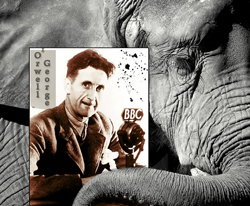
Source: “At Rest” and “George Orwell,” digitalART2 and Lavi-Schroeder, Flickr
“Shooting an Elephant” is an essay by George Orwell, first published in the literary magazine New Writing in the autumn of 1936 and broadcast by the BBC Home Service on October 12, 1948. The essay has been viewed as both an apology for, and criticism of, imperialism. It is often seen as the most celebrated of Orwell’s shorter works.
The essay describes the experience of the English narrator, possibly Orwell himself, called upon to shoot an aggressive elephant while working as a police officer in Burma. Because the locals expect him to do the job, he does so against his better judgment.

Near the beginning of the essay
When I pulled the trigger I did not hear the bang or feel the kick—one never does when a shot goes home—but I heard the devilish roar of glee that went up from the crowd. In that instant, in too short a time, one would have thought, even for the bullet to get there, a mysterious, terrible change had come over the elephant. He neither stirred nor fell, but every line of his body had altered. He looked suddenly stricken, shrunken, immensely old, as though the frightful impact of the bullet had paralyzed him without knocking him down. At last, after what seemed a long time—it might have been five seconds, I dare say—he sagged flabbily to his knees. His mouth slobbered. An enormous senility seemed to have settled upon him. One could have imagined him thousands of years old. I fired again into the same spot. At the second shot he did not collapse but climbed with desperate slowness to his feet and stood weakly upright, with legs sagging and head drooping. I fired a third time. That was the shot that did for him. You could see the agony of it jolt his whole body and knock the last remnant of strength from his legs. But in falling he seemed for a moment to rise . . . And then down he came, his belly towards me, with a crash that seemed to shake the ground even where I lay.
Last paragraph of the essay
Afterwards, of course, there were endless discussions about the shooting of the elephant. The owner was furious, but he was only an Indian and could do nothing. Besides, legally I had done the right thing, for a mad elephant has to be killed, like a mad dog, if its owner fails to control it. Among the Europeans opinion was divided. The older men said I was right, the younger men said it was a damn shame to shoot an elephant for killing a coolie, because an elephant was worth more . . . And afterwards I was very glad that the coolie had been killed; it put me legally in the right and it gave me a sufficient pretext for shooting the elephant. I often wondered whether any of the others grasped that I had done it solely to avoid looking a fool.

- Write what tone you think the writer uses in the first paragraph.
- Did you notice any other connotative words in the first paragraph? What do you think the phrase “devilish roar of glee” connotes?
- An author’s tone can change throughout a piece of writing. Reread the last paragraph of the excerpt. It’s actually the last paragraph of the entire essay. Here Orwell shifts from describing the elephant to describing the narrator. What do you think is the tone of the last paragraph? You should notice a change in tone from paragraph two and also a change within the paragraph itself.
Sample Response:
The tone in this scene is horrific and sad. As you read and watch the elephant die, you probably sense the hopelessness of his situation and may even pity the elephant.
Sample Response:
“Devilish roar of glee” suggests how happy the crowd was after the narrator shot his gun; they were in high spirits, taking great pleasure in hearing the bullet make its way to the elephant. “Bang” implies a harsh sound, a quick finality to the elephant’s life even though Orwell admits he didn’t hear the shot. “Thousands of years old” exaggerates the elephant’s struggle before giving in to his death. Orwell observes the elephant quickly experiencing the process of old age before dying. “Shake the ground” communicates the tremendous weight of the elephant as he “crashes” to the ground and also suggests an emotional “shaking” or agitation of the shooter and the crowd.
Sample Response:
In the last paragraph, the author’s tone for the most part is resigned and apologetic. The narrator claims killing a mad elephant was the right thing to do. However, the very last sentence has a different tone when the narrator writes, “I often wondered whether any of the others grasped that I had done it solely to avoid looking a fool.” He’s rather rueful and sarcastic when he admits that he had to shoot the elephant to prove to the bystanders he wasn’t a coward— that he was a man brave enough to shoot an elephant.
Now that you have completed the lesson, take this quiz.
